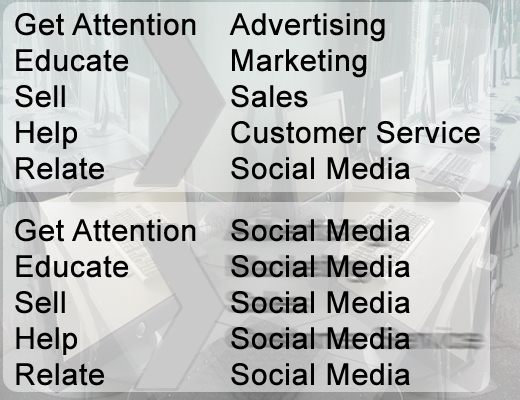
It may seem a little overzealous on my part, but I’d argue that social media is changing almost every aspect of our society. I have previously discussed how technology is leading us towards a more open society, as well as the privacy issues associated with this evolution. There is no doubt that social media is changing the way we do business. I think Brian Solis says it best:
“Social Media is not only changing how we communicate, we are also changing the culture of business from the outside in and from the bottom up.”Let me elaborate. Social media is starting to impact nearly all functional areas of business, including: marketing/sales, human resources, customer services, research and development, finance & accounting, and administration/IT support. I will provide you with an example for each:
Marketing/Sales
 This one isn’t difficult to illustrate, since there seems to be a different cutting-edge creative strategy showcased daily. In any case, Starbucks’ recent announcement that Foursquare Mayors of Starbucks can now get discounts is brilliant. People love the competition of the location-based social network, and now there is a quantifiable reward for visiting the coffee shop. This will definitely increase repeat visits and keep the most loyal customers satisfied.
This one isn’t difficult to illustrate, since there seems to be a different cutting-edge creative strategy showcased daily. In any case, Starbucks’ recent announcement that Foursquare Mayors of Starbucks can now get discounts is brilliant. People love the competition of the location-based social network, and now there is a quantifiable reward for visiting the coffee shop. This will definitely increase repeat visits and keep the most loyal customers satisfied.
Human Resources
Companies are using social media to hire, retain and leverage employees. Social media has also been the reason for many people getting fired, as about 8% of US companies have dismissed an employee for misuse of social media. This, in turn, has led to the personal branding phenomenon online.
Customer Service
 These days, consumers vote on your service with more than just their dollars—they can rally a crowd using social media. One of the most prominent examples of this the Youtube hit United Breaks Guitars, since over 8.5 million people saw this video. Companies now understand the need to be diligent with their service in the first place and to have a quick response if this does occur. Seth Godin has a pretty good rule of thumb:
These days, consumers vote on your service with more than just their dollars—they can rally a crowd using social media. One of the most prominent examples of this the Youtube hit United Breaks Guitars, since over 8.5 million people saw this video. Companies now understand the need to be diligent with their service in the first place and to have a quick response if this does occur. Seth Godin has a pretty good rule of thumb:
Research and Development
Many areas of research are now incorporating social media, but I find product testing to be the most interesting. People trust other consumers’ reviews. Brands are thus targeting those with a large sphere of influence to get their opinions on products and report to their followers. For example, brands are targeting individuals with a high Klout Score. I got asked to sample a brand of yogurt and to share my opinion on twitter, and it came with the following message:
Just a quick note: in the interest of full disclosure, be sure to include a link to [removed] if you share your opinion of [removed] on Twitter. It lets followers know that we sent you a free sample. Transparency is all the rage these days.Finance & Accounts
 Simply put, social media helps generate revenue. A perfect example is Diaspora, which was able to raise more than the required amount of money to create a personally controlled, do-it-all, distributed, open-source social network. People are concerned about privacy, so this company is proposing to create a network where nobody else owns your information.
Simply put, social media helps generate revenue. A perfect example is Diaspora, which was able to raise more than the required amount of money to create a personally controlled, do-it-all, distributed, open-source social network. People are concerned about privacy, so this company is proposing to create a network where nobody else owns your information.
Administration / IT Support
Companies are using Twitter as an IT support system to give consumers personalized and quick responses that point them in the right direction. This customer support model goes hand in hand with good customer service, as it often adequately and efficiently addresses consumer issues before they get too complicated. Here is an example of Verison using Twitter to assist in solving product issues.
It is clear that the way businesses communicate with consumers has fundamentally changed. Jim Sterne beautifully illustrates the magnitude of this change:




{ Comments are closed! }